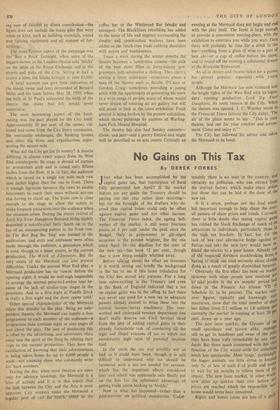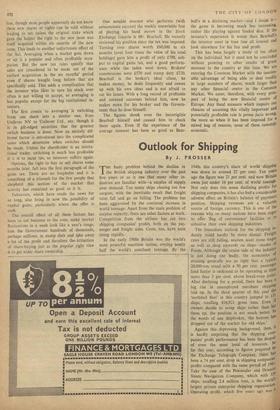No Gains on This Tax
By DEREK FORBES
:vs-r what has been accomplished by the capital gains tax, that masterpiece of fiscal folly perpetrated last April? If the market indices are any guide the Treasury should be paying out this year rather than receiving— but for the foresight of the drafters who de- creed that capital logses could only be offset against capital gains' and not other income. The Financial Times• index, the ageing bell- wether of the markee, is still some fourteen points, or 5 per cent. :under the peak since the Budget. Only in golernment or gilt-edged securities is the pictOiT brighter, for the rise since April 10—the ddadline for the start of the new tax--ehas beea 12 per cent., though that is now being steadily whittled away.
Before talking abotiO the effect on investors it is worth setting out: briefly the background to the tax to see if this latest tribulation for the City has served any purpose. For a long time sabre-rattling in the Treasury and even in the Bank of England indicated that a tax on capital gains was in the offing. In fact there was never any need for a new tax as adequate powers already existed to bring these into the normal income/surtax machinery. The over- worked and underpaid revenue department (we don't really deserve our Civil Service) shied from the idea of adding capital gains to their already formidable task of combating all the legal and illegal evasions of tax to which our inordinately high rates of personal taxation lead.
In the event the tax was possibly not as bad as it could have been, though it is still difficult to understand why we should be lumbered with a tax not needed for revenue, which has the important effects considered later and which was apparently only finally put on the lists for the ephemeral advantage of getting trade union backing to `Noddy.'
Now to what has happened—rather than a post-mortem on political manoeuvres. Unfor- tunately there is no man in the country, and certainly no politician, who can extract froth the myriad factors which make share prices just those that can be laid at the door of the new tax.
It is a straw, perhaps not the final straw but important enough to help shape the over" all pattern of share prices and trends. CurrentlY there is little doubt that taxing capital galas has robbed the Stock Exchange of much of .45 attractions to individuals, particularly those is the high tax brackets. In fact, but for the lack of 'any real alternative hedge against in" flation and tax,'- the new levy would have l'e• dticed the' market to a poor house. Already one of the respected nbrthern stockbroking firms 15 having to think out 16ud seriously about closing cfovvn as a result of greatly diminished turnover' Obviously the first effect has been on market turnover with nioee people now resolved 0°.1 to- take profits in the six months' period law, down in the Finance Act (clause VII 01 Schedule D, to be precise). The market lur11• over figures, typically and knowingly very inaccurate, show that the total number of deal has fallen from 2.1 million to 1.8 million and currently the market is running at least 20 Per cent. down on a year ago. The new issue market, the Elysium of the small speculator and tycoon alike, manages still to get its headlines and some of the price rises have been truly remarkable by any dards. But those much concerned with this vita function of the City would settle for something much less spectacular. Most 'stags,' particular!), the bigger animals, see little virtue in keening only 5s. or less of each £ of profit and prefer to wait for six months to relieve them of thl5 impost. The new issue market, in other words' now dries up quicker than ever before ati., prices are reached which the responsible issue house would never have conceived.
Rights and bonus issues are less of a prop' Lem, though most people apparently do not know these new shares or rights can be sold without leading to tax unless the original stake which gave the holder the right to the new issue was itself acquired within six months of the new issue. This leads to another unfortunate effect of the Act. Averaging when a market goes down or up is a popular and often profitable occu- pation. But the new tax rules specify that sales are considered to be made out of the earliest acquisition in the six months' period even if shares bought long before that are specifically sold. This adds a complication that the investor who likes to turn his stock over often is not willing to accept, so averaging is less popular except for the big institutional in- vestors.
The first cousin to averaging is switching from one share into a similar one, from Unilever NV to Unilever Ltd.. say, though it is in gilt-edged securities that the greatest switch business is done. Now an entirely dif- ferent factor is introduced into the complicated sums which determine when switches should be made. Unless the shareholder is an institu- tional trader, switching is much less profitable if it is to incur tax, so turnover suffers again.
Options, the right to buy or sell shares some months later, fall into the first paragraph of the gains tax. There are no loopholes and it is something of a triumph for the few people that shepherd this section of the market that activity has remained as good as it is.
Takeovers, which have made the news for so long, also bring in now the possibility of capital gains, particularly where the offer is cash.
The overall effect of all these factors has been to cut business to the core, make market fluctuations in a week look like a year's range, lose the Government hundreds of thousands, perhaps millions, in stamp duty and take away a lot of the profit and therefore the attraction of share-buying just as the popular right view is to get wider share ownership.
One notable investor who performs (with consummate success) the weekly unenviable feat of playing his hand ()avert in the Stock Exchange Gazette is Mr. Bearbull. He recently reviewed his position since the tax was imposed. Turning over shares worth £60,000 in six months (over four times the value of his total holdings) gave him a profit of only £700, sub- ject to capital gains tax, and a good perform- ance while the index went down. Brokers' commissions were £570 and stamp duty £720. Bearbull is the broker's ideal client, he makes money, he deals frequently and comes up with his own ideas and is not afraid to cut his losses. With a long record of profitable and untaxed successes behind him, now he makes more for his broker and the Govern- ment than he does himself.
The figures shook even the incorrigible Bearbull himself and caused him to check them again. Even if the experience of the average investor has been as good as Bear-
bull's in a declining market—and 1 doubt it— the game is becoming much less interesting, rather like playing against loaded dice. If the investor's experience is worse than Bearbull's the investor must in time lose all interest and look elsewhere for his fun and profit.
This has been largely a study of the effect on the individual, but it must not be concluded without pointing to other results of grave moment to the country at this time, We are entering the Common Market with the inestim- able advantage of being able to deal readily in large numbers of shares, much larger than any other financial centre in the Common Market. We enter, therefore, with every pros- pect of being the new financial centre of Europe. Any fiscal measure which impairs our chances of assuming this vitally important and potentially profitable role is prima facie wrong, the more so when it has been imposed for a mixed bag of reasons, none of them remotely economic.







































 Previous page
Previous page